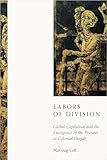Labors of division : global capitalism and the emergence of the peasant in colonial Punjab / Navyug Gill.
Series: South Asia in motionPublisher: Stanford, California : Stanford University Press, [2024]Description: xvi, 355 pages ; 24 cmContent type:- text
- 9781503637498
- 305.5 GIL
| Item type | Current library | Shelving location | Call number | Materials specified | Status | Notes | Date due | Barcode | |
|---|---|---|---|---|---|---|---|---|---|
 BOOKs
BOOKs
|
National Law School | General Stacks | 305.5 GIL - 2 (Browse shelf(Opens below)) | PB | Checked out | Recommended by Dr. Sushmita Pati | 03.02.2026 | 39751 | |
 BOOKs
BOOKs
|
National Law School | General Stacks | 305.5 GIL (Browse shelf(Opens below)) | PB | Available | Recommended by Dr. Anwesha Ghosh | 39603 |
Includes bibliographical references and index.
List of Illustrations;
Acknowledgments;
Introduction In Pursuit of Peasant Histories and Futures in Colonial Panjab;
1. A Rule of Benevolence? Revenue, Knowledge, and the Accumulation of Difference;
2. Naming the Peasant: Colonial Jurisprudence and the Binding of Identity and Occupation;
3. The Logic and Illogic of Debt: Reason and Capitalist Volatility in the New Agrarian Market;
4. Horizons of Hierarchy: Caste, Landlessness, and the Limits of Religious Conversion;
5. Producing a Theory of Inadequacy: Adam Smith, Karl Marx, and the Political Economy of Comparison;
Conclusion: Global History and the Impermanence of Hierarchy;
Notes;
Bibliography;
Index.
"The peasant has long been one of the most durable figures in modern history and the site of intense intellectual and political debate. Yet underlying much of this literature is the assumption that peasants simply existed everywhere, a general if not generic group, traced backward from modernity to antiquity. Focused on the transformation of Panjab during the nineteenth and early twentieth centuries, this book accounts for the colonial origins of global capitalism through a radical history of the concept of "the peasant," demonstrating how seemingly fixed hierarchies were in fact produced, legitimized, and challenged within the preeminent agricultural region of South Asia. Navyug Gill uncovers how and why British officials and ascendant Panjabis disrupted existing forms of identity and occupation to generate a new agrarian order in the countryside. The notion of the hereditary caste peasant engaged in timeless cultivation thus emerged, paradoxically, as a result of a dramatic series of conceptual, juridical, and monetary divisions. Far from archaic relics, this book ultimately reveals both the landowning peasant and landless laborer to be novel political subjects forged through the encounter between colonialism and struggles over culture and capital within Panjabi society. With this history, Gill brings difference and contingency to understandings of the global past in order to re-think the itinerary of comparative political economy as well as alternative possibilities for emancipatory futures"-- Provided by publisher.
There are no comments on this title.
